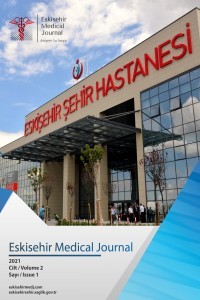Gut ve Paget Hastalığı Birlikteliği; Bir Tesadüf Mü?
Kemiğin paget hastalığı(PH), yaşlanan iskelette meydana gelen fokal bir kemik metabolizması bozukluğudur ve hızlanmış bir kemik yapım-yıkım döngüsü ile karakterizedir. Kemiğin bir alanında veya birden çok alanında görülerek, kemiğin aşırı büyümesine ve kemik bütünlüğünün bozulmasına neden olur. Yaygın olarak etkilenen bölgeler arasında kafatası, omurga, pelvis ve alt ekstremitenin uzun kemikleri bulunur. Hastaların çoğu asemptomatiktir ve ileri yaş grubunda sık görülür. Bu tür hastalarda teşhis genellikle tesadüfen, kemik kökenli alkalen fosfatazın serum konsantrasyonunun arttığı veya başka bir sebepten çekilen görüntüleme yöntemlerinde kemikte pagetik değişikliklerin olması ile konulur. Hastalık patogenezinde genetik faktörler rol oynar, fakat hastalığın moleküler temeli hala açık değildir. Histopatolojik olarak artmış osteoklast formasyonu ve kemik yıkımını takip eden aşırı yeni kemik oluşumu ile karakterizedir. Gut, hiperürisemi ile ilişkili ve eklemlerdeki ürik asidin kristalleşmesiyle tetiklenen bir inflamatuar artrit türüdür. PH hastalarında hiperürisemi ve gut görülebilir. Bu, hızlanmış kemik yapım- yıkımından artan nükleik asit döngüsüne ikincil olabilir. Bu raporda, gut tanısı olan ve daha sonra PH tanısı alan hastayı ve gut ile PD arasındaki ilişkiyi tartışmak amacıyla sunuyoruz.
Anahtar Kelimeler:
Paget hastalığı, hiperürisemi, gut
Coexistence of Gout and Paget's Disease; Is It a Coincidence?
Paget disease of bone (PDB), is a focal disorder of bone metabolism that occurs in the aging skeleton and it is characterized by an accelerated rate of bone remodeling, resulting in overgrowth of bone at single or multiple sites and impaired integrity of affected bone. Commonly affected areas include the skull, spine, pelvis, and long bones of the lower extremity. The majority of patients with PDB are asymptomatic and the frequency of the disease increases in later ages. The diagnosis in such patients is usually made incidentally following a routine chemistry screen showing an elevated serum concentration of alkaline phosphatase of bone origin or an imaging study obtained for some other reason that shows pagetic changes in bone. Genetic factors play a role in the pathogenesis of Paget's disease but the molecular basis of the disease remains unclear. Histopathologically the disease is characterized by markedly increased osteoclast formation and bone resorption followed by excessive new bone formation. Gout is a type of inflammatory arthritis triggered by crystallization of uric acid within the joints apart from being associated with hyperuricemia. Hyperuricemia and gout can be seen in patients with PDB. This may be secondary to increased nucleic acid turnover in accelerated bone remodeling. In this report, we present a gout patient who later diagnosed as having PD and discuss the relationship between gout and PD.
Keywords:
Paget’s disease, hyperuricemia, gout,
___
- 1. Doherty M. New insights into the epidemiology of gout. Rheumatology (Oxford). 2009 May;48 Suppl 2:ii2-ii8.
- 2. Lluberas-Acosta G, Hansell JR, Schumacher HR Jr. Paget's disease of bone in patients with gout. Arch Intern Med. 1986 Dec;146(12):2389-92.
- 3. Calvo MS, Eyre DR, Gundberg CM. Biological markers of bone turnover. Endocr Rev. 1996;17:333-68.
- 4. Alvarez L, Guañabens N, Peris P, et al. Discriminative value of biochemical markers of bone turnover in assessing the activity of Paget's disease. J Bone Miner Res. 1995 Mar;10(3):458-65.
- 5. Terán Tinedo MA, Moratalla CP, Quiñones Torres JR. AB0891 Hyperuricemıa and gout in patients with paget’s disease of bone. Annals of the Rheumatic Diseases. 2019;78:1913.
- 6. Korkmaz C. Should we routinely evaluate serum alkaline phosphatase levels in patients with gout? Rheumatol Int. 2011 Nov;31(11):1501-2.
- ISSN: 2718-0948
- Yayın Aralığı: Yılda 3 Sayı
- Başlangıç: 2020
- Yayıncı: Eskişehir Şehir Hastanesi
Sayıdaki Diğer Makaleler
Serebral Venöz Trombozunda Çoklu Risk Faktörü: Olgu Sunumu
Zeynep ÖZÖZEN AYAS, Gülgün UNCU
Ailesel Akdeniz Ateşi ve Multipl Skleroz Birlikteliği: Olgu Sunumu
Duygu ARSLAN MEHDİYEV, Egemen İDİMAN
Nadir Bir Olgu: Non-koroner Sinüs Valsalvadan Köken Alan Sirkumfleks Koroner Arter
Mehmet ÖZGEYİK, Müfide OKAY ÖZGEYİK
Gut ve Paget Hastalığı Birlikteliği; Bir Tesadüf Mü?
